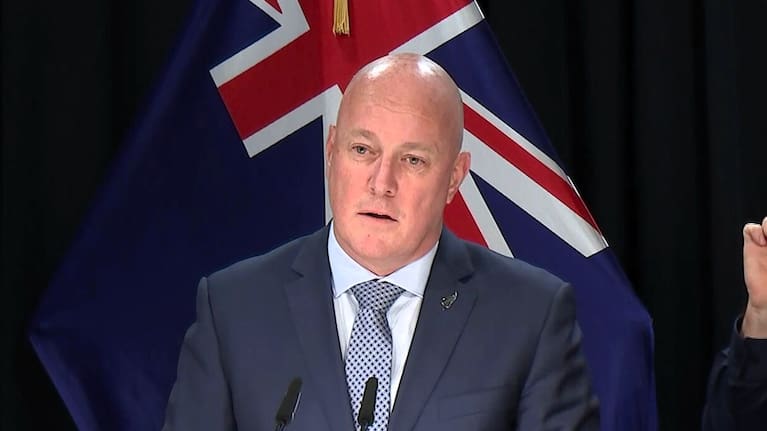Prime Minister Christopher Luxon says the Government’s approach around Māori issues and the Treaty of Waitangi didn't influence the defacement of the Treaty exhibition at Te Papa today.
Luxon was asked about the vandalism at his regular post-Cabinet press conference this afternoon.
It follows the protest action at the national museum today, where a wooden display panel showing the English translation of the Treaty of Waitangi was damaged with spray paint and a power tool.
Protest group Te Waka Hourua said it was in protest of Te Papa displaying the translation opposite the te reo Māori version, which it said was misleading visitors that it was an accurate translation of te Tiriti, the Māori version of the document.
There is no relationship between the group called ‘Te Waka Hourua’ and any waka hourua organisations in Aotearoa, or the national body that protects kaupapa and mātauranga waka hourua, Te Hau Kōmaru National Waka Hourua Board said.
Twelve protesters were arrested in relation to the defacing. A 29-year-old man has been charged with intentional damage, a 53-year-old woman has been charged with intentional damage, while a 46-year-old man and 52-year-old woman were charged with breach of bail. Eight other protesters were arrested for trespass after refusing to leave Te Papa.
It follows other protests around the country last week in direct opposition to some of the Government’s announced policies, including a revision of the principles of the Treaty of Waitangi, removing references to the Treaty in legislation and removing or demoting te reo Māori names from government entities, such as the New Zealand Transport Agency.
Asked if he believed the Government’s rhetoric around the Treaty of Waitangi and Māori was why a display of the English version of the Treaty was defaced at Te Papa today, Luxon said no.
“Not at all. I’m incredibly proud of the Treaty of Waitangi and the origins that it’s formed in forming our country.”
He said over the last 180 years New Zealand had been “wrestling” with the document, “to understand what was meant, who signed it, and why they signed it, and what the intention was behind that”.
“We’ve all been wrestling with that and that’s been something that’s incredibly positive and made us a much more tolerant, and I think, a much better country as a result.

“For me as a new prime minister, I want to make sure that we continue down that pathway, we’re always going to be a country with strong bicultural traditions, we’re also going to be a country that is a modern multicultural country going forward well in the world.
“We have to demonstrate to everybody, Māori and non-Māori, that we are about delivering better outcomes for everyone.”
He said people should feel free to protest but he didn’t think there was “any need to deface an exhibition like that”.
He said he didn’t want Māori to feel discriminated against.
“That’s not at all how I want anyone to feel.”
He said in his conversations with iwi leaders included “underscoring to them that we want Māori to get ahead”.
“When New Zealand does well, it’s because Māori are doing well. And that’s very much a focus of our government.”
He said the Government was going to work with Māori and iwi to “make sure we deliver and improve outcomes for Māori”.




















SHARE ME